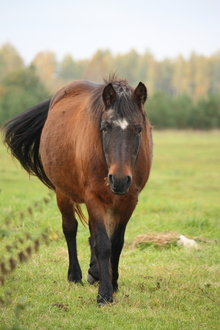Many owners offer their horses antioxidant supplements such as vitamins C and E. In some cases, this might be without a solid understanding of what antioxidants do and how they benefit horses.

Is an antioxidant supplement right for your horse?
Fat-soluble vitamins like vitamin E must be offered to horses in a way that maximizes absorption. It must become water-soluble or dispersible in liquid.
To illustrate how oxygen is both vital and dangerous to a horseâs body and the role antioxidants play in combating oxidative stress, consider these points:
1. Oxygen is 100% essential for almost all living creatures. Inhaled oxygen drives metabolic processes and helps cells produce energy.
2. Some oxygen molecules form damaging âreactive oxygen speciesâ (ROS) while producing energy. These molecules are also called free radicals. Some of the most common oxygen free radicals include the hydroxyl radical, superoxide anion radical, and hydrogen peroxide.
3. Free radicals are unstable ions that, at a molecular level, have an unpaired electron. Recall that molecules are unhappy until they are paired in some way with other unhappy molecules and form stable compounds. For example, one sodium (Na+) ion combines with one chloride ion (Cl-) to form NaCl or sodium chloride, known commonly as salt.
4. Free radicals bounce around the cell nucleus or cell membrane trying to donate or accept electrons from other cellular molecules they encounter. Frequently, they react withâand damageâDNA strands, proteins, and the fats found in cell membranes, setting off a chain reaction of other molecules stealing or donating electrons.
5. During exercise, horses inhale more oxygen than usual to meet the demand of their muscles. Along with supporting the muscular oxygen needs, free radicals are produced and horses suffer oxidative stress.
6. Damage by free radicals is associated with aging and various diseases. Cells have natural defense mechanisms in place to combat free radicals. These natural antioxidants are free-radical scavengers that donate electrons to rampaging free radicals but remain stable themselves with unpaired electrons.
7. Natural antioxidants are either individual molecules or complex enzymes and enzyme systems. Many antioxidants can be supplied in the diet. Classic examples of dietary antioxidants include β-carotene, vitamin C, and vitamin E.
8. Oxidative stress comes from an imbalance between free radical production and antioxidant defenses. Supplementing horses with antioxidants helps alleviate oxidative stress by bringing the environment back into balance.
Vitamin E, an essential component of body-wide antioxidant defenses, requires a small amount of fat in order to be properly absorbed. The more vitamin E that is absorbed into the bloodstream, the more available it is for use as a body-wide antioxidant essential for tissue repair and for its imperative roles in various body systems.
Fat-soluble vitamins like vitamin E must be offered to horses in a way that maximizes absorption. It must become water-soluble or dispersable in liquid. Due to its oily nature, vitamin E repels water.
To overcome this, researchers use proprietary technology to encapsulate the vitamin E in nanoparticles and then surround each nanoparticle with a water-loving outer layer. The outer layer allows the nanoparticles to be rapidly and evenly released in water-based environments such as the gastrointestinal tract. The greatest benefit of this unique delivery system is an increase in the bioavailability of vitamin E.
Nanoâ¢Eï is a powerful water-soluble liquid vitamin E antioxidant supplement for horses in this unique, rapidly bioavailable form. Controlled studies at Kentucky Equine Research (KER) indicate that Nanoâ¢E is superior to synthetic and other natural vitamin E sources. Wondering if this supplement is right for your horse? Just share a few details here and a KER nutrition advisor will be in touch.
About Kentucky Equine Research
Kentucky Equine Research (KER) is an international equine nutrition, research and consultation company serving both the horse producer and the feed industry. Its goal is to advance the industry's knowledge of equine nutrition and exercise physiology and apply this knowledge to produce healthier, more athletic horses. For more information, see www.ker.com or call 888-873-1988.
